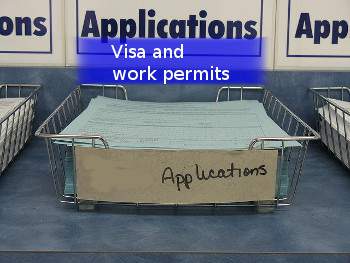The Employment Rights Advice Blog
 Articles, news and updates on employment law in Ireland
Articles, news and updates on employment law in Ireland
for employees and employers
____________________________________________________________________________________________________________________________________________________________________________________________________________________________________________________________________________________________________________________________________________________________________________________________________________________________________________________________
Fair Grounds for Dismissal
If you do not use fair grounds you will be caught on a merry-go-round of claims

Under the Unfair Dismissals Acts 1977-2015 a qualifying dismissal is presumed unfair unless it can be justified under certain grounds. It is weighted in favour of the employee because dismissal can have such a major impact on the life of the employee.
In most unfair dismissal cases where the employee succeeds, it arises to a large extent because of the failure of the employer to follow the correct procedure and to base the dismissal on one of the fair grounds for dismissal. The onus is on you the employer to show that there were fair grounds for the dismissal.
How can I as an employer in Ireland fairly dismiss an employee?
There are three hurdles which you must cross.
-
You have to demonstrate that the dismissal was based on one of the fair grounds for dismissal covered under Irish Employment law.
-
You must be able to prove that you followed fair procedures and that you acted fairly.
-
You must avoid any of the automatically unfair reasons for dismissal.
What are the fair grounds for dismissal ?
The grounds for dismissing an employee in Ireland which are considered fair are the following:
-
Capability
-
Competence
-
Qualifications
-
Conduct
-
Redundancy
-
Contravening the law
-
Other substantial grounds
Let’s examine each one in more detail.
Capability
In order to show that the employee was not capable of performing their work tasks in a capable manner you need to examine areas of performance such as absenteeism more , lateness, regular absence through injury or illness. This includes short term as well as long term illness/injury. How are those absences impacting the business? Will things improve? Have you warned the employee that dismissal is being considered? The whole area of dismissing an employee on sick leave is difficult. Each case tends to be different. You need to consider every aspect before you decide to dismiss an employee while on certified sick leave from work. Even when you are confident that you have ticked all the boxes, you should seek professional assistance. It can be very useful to have a fresh pair of eyes look at the problem. Then when you take action, you can have the peace of mind that comes from knowing that you are following the correct dismissal procedures.
In the case of absence as a result of long term illness you should obtain medical evidence which indicates that the employee will not be fit to return to work for a long period. You then have to be able to prove that the prolonged absence is negatively impacting the business.
If the employee’s illness comes under employment equality legislation as a disability, you need to ensure that you do not breach any of the employees rights in that area.
Where the issue of capability involves lateness and absenteeism, not based on illness or injury, you need to document the incidence of lateness or absenteeism Keep copies of clocking in records or other time checking software which shows that there is a pattern of lateness and/or absenteeism.
You then need to follow correct procedures. Do you have procedures in place for dealing with this? Are they fair? Do they follow the rules of natural justice? If so, then you must follow them. If not then you need to introduce a policy and procedures straight away. Contact us for help in that regard.
Here's an article on procedures and codes of practice
The process should involve proving that there is a problem resulting from the employee’s proven absenteeism/lateness. Then it must be brought to the attention of the employee in a constructive way and the opportunity to improve must be afforded them.
Competence
This refers to the employee’s ability to carry out the tasks involved in their job. What standards are expected from the employee when carrying out the job for which they were hired.
See our article on performance reviews
Where the employee falls short of that standard, this must be brought to their attention . They should be told what improvements are required and they must be afforded a reasonable timeframe in which to improve. If agreed improvements do not follow, then you must give the employee a final warning which includes the real possibility of dismissal.
Qualifications
This is probably the most straightforward of grounds. The employee either has or hasn’t the necessary qualifications. Just make sure that when advertising the job and the whole process of filling the post, including the employment contract See , it was made clear that the qualification was an essential part of carrying out the job. The circumstances in which dismissal may arise are ususlly one of two. Either the employee misled you about having the required qualifications, or continuing qualification is required and not achieved. This can arise where continuing professional development is obligatory and the employee fails to comply, having been afforded a reasonable time to do so.
Conduct
This covers a wide area. It can range from Gross misconduct, justifying instant dismissal to ordinary misconduct. You should list the behaviour which is regarded as gross misconduct in your contract of employment. The usual examples include assault,stealing See Fraud at Work , drunk at work see our article on intoxication in the workplace , bullying For more see or serious breach of workplace policies.
You should have written Grievance and Disciplinary Procedures See article on Disciplinary Policy , which must be brought to the attention of the employee by way of a copy.
Learn about gross misconduct in this article
For more on disciplinary and grievance at work see
Redundancy
You will have to show that a real redundancy situation exists. The employee must be fairly selected for redundancy. Remember,in the first instance it is the position which is made redundant, not the employee. So get your proofs in order.
See our article on Redundancy here
Contravening the law
This does not arise as frequently as other grounds. If a situation arises where it would be against the law for your employee to continue working for you, then you may be justified in dismissing them. It can arise where a driver loses their driving licence and therefore cannot legally drive. You may be expected to offer alternative suitable employment, if same was available. Each case is judged on its own circumstances.
Other substantial grounds
This is a “catch all” ground which covers a situation which does not meet the above criteria but which would be regarded as substantial. You should take independent advice before you act on this ground. Your idea of substantial may not match the Rights Commissioners opinion.
Automatically Unfair Grounds
Employment equality legislation sets out grounds for dismissal which are automatically unfair. For more see
Fair procedures
The common thread running through aall of these grounds is, you must follow fair procedures. You will lose the protection offered by a fair ground if you fail to follow fair procedures when dismissing an employee.
I would like help with setting up and implementing procedures to deal with dismissal , grievance and disciplinary issues.
Contact us using the orange Tell Me More button below and we will be glad to help.
Spread the knowledge. If you found this article useful, please like and share using any of the social buttons below.
Image courtesy Dominic Simpson  Some modification (banner)
Some modification (banner)
Help for the Employer
Better together

Running a business is tough enough without having to be an expert in Irish Employment Law as well.
If you make a mistake when dealing with an employee under the many employment law rules and regulations, it can cost you a lot of trouble and expense.
The cost effective solution is to outsource your employment law needs.
Become a member of ERA Employer today.
Reduce the risk of trouble starting.
We can help you with contracts,investigations, legal representation, all of your employment law needs. We offer the most cost effective solution for your needs.
You can relax knowing that your employment law needs are covered.
Become a member. Complete the form. We will contact you to help you choose the best support package for your needs. We can tailor make a package to suit your requirements. Just ask. Start saving.
Work Permit and Visa Applications
Sorting the paperwork
 Employment Permits
Employment Permits
All non-EEA national must have an employment permit in order to work in Ireland, with the exception of EEA and national of Switzerland. The Employment Permits (Amendment ) Act 2014 is the most recent legislation dealing with employment permits in Ireland. It lists nine different types of employment permit:
1. Critical Skills Permit
2. Dependent/Partner/Spouse Employment Permit
3. Intra- Company Transfer Employment Permit
4. General Employment Permit
5. Contract for Services Employment Permit
6. Reactivation Employment Permit
7. Internship Employment Permit
8. Sport & Cultural Employment Permit
9. Exchange Agreement Employment Permit
The Act also introduced protection for the worker who is unable to obtain a work permit after taking all reasonable steps to obtain one. That worker can now sue their employer for work done and/or services rendered.
As an Employer where can I get help and advice in relation to applying for work permits ?
At Employment Rights Advice, we can process the applications on your behalf. Sending in a fully completed application for is the key to an early decision. We can take the hassle out of the process, allowing you to focus on helping your new workers become productive and happy members of your workforce.
How can I contact you?
You can contact us using the orange Tell Me More button below and we will call you at a time that is convenient, to discuss your needs.
Spread the knowledge. If you found this article useful, please like and share using any of the social buttons below.
Image courtesy Gilad Raphaelli 
Codes of Practice
Practice makes perfect
 The whole area of employment law in Ireland is a complex balance between rights and obligations. It can sometimes be difficult to know what to do in a particular situation, especially if it is new to you.
The whole area of employment law in Ireland is a complex balance between rights and obligations. It can sometimes be difficult to know what to do in a particular situation, especially if it is new to you.
What procedure should I follow? How can I avoid making things worse? What is the right thing to do?
That is where a code of practice can prove useful.
If , as an employer, you follow the steps outlined in the relevant code of practice then you know that you have a strong defence to any legal action which may be taken. On the other hand if you fail to follow the correct procedure then you are leaving yourself and your company exposed to possible litigation.
How do I keep up to date on the various codes of practice in Irish employment law?
To keep up with the changes in Irish employment law, you should subscribe to our newsletter. It is completely free and we only post when there are significant matters to report on.
We also strongly recommend taking out an annual subscription to our employers support package.
That way access to our experts is only a phone call, or email away.
Check out the regular articles on our website.
Download information and codes of practice for Irish Employers from our Great Guides section.
You can also subscribe via a reader![]() . That way you will be notified by email every time there is a new article on employment law in Ireland.
. That way you will be notified by email every time there is a new article on employment law in Ireland.
Can I get guidance on writing my own policies?
Create policies to suit your circumstances using our legal templates.
Prevention is always better than cure
It can be tempting to put off doing something about your employment law obligations untill something goes wrong and deal with it then. If that happens your choices are greatly reduced, work relationships may be compromised and there will amost certainly be bad publicity.
It is better to review your situation now and have the peace of mind that comes from knowing that you are using the most current methods of dealing with the many issues which arise regularily in Irish employment.
Contact us today using the orange Tell Me More button below for a free initial consultation.
Spread the knowledge. If you found this article useful, please like and share using any of the social buttons below.
Image courtesy Alan Levine 
Latest Employee Blogs
- Performance Improvement Plan or Exit Strategy?
- Whistleblower awarded five years salary by Workplace Relations Commission
- Unlawful COVID-19 pay cut
- Unfair Redundancy Case
- How to raise a problem at work
- Trade Secrets and Whistleblowing
- Is your fixed term contract valid?
- What is it like to bring an unfair dismissal claim?
- Employer relocation
- End of P45
Latest Employer Blogs
- Changes to probationary period
- Redundancy Update
- COVID-19 Vaccination Data in the workplace
- Statutory Sick Pay Scheme
- The Right to Disconnect
- Covid-19 Can I use lay off and short time to cope with Covid-19 ?
- Covid-19 (The Coronavirus) Tips for employers
- Social Media Monitoring in the Workplace
- Using 3rd party CCTV footage
- Do I need a Data Protection Officer ?









